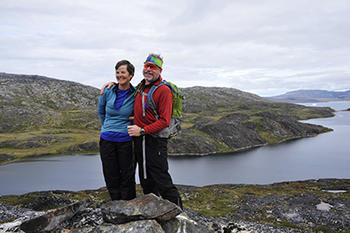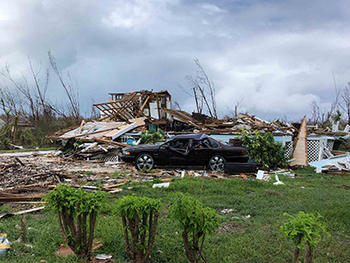Risk is a funny thing. It’s more perception than fact; a personality quirk; a kind of fingerprint—there are as many variations and ways of viewing and assessing it as there are people in the world. When Bradley Rosenberg (Accounting ’80 and EMBA ’93) and Kathy Clark (EMBA ’95) talk about risk, they talk about the risk of not doing. It’s a heavier weight, they imply, to not do something. It’s a higher risk. At age 26, Clark had been at her first professional job for eight years already. She’d started as a grade two file clerk and worked her way up to being a senior systems programmer.

She looked around her office, she says, and saw people who’d been there for 30 years. When she quit to go full-time with her own start-up company, she was barely over a quarter-century old and had no college degree. Her former boss pulled her aside and asked if she understood the risk she was taking in giving up her job. “I was dumbfounded,” Clark remembers. “The only risk was that the company would fail. If that happened, I’d still have gained experience and would be able to get another job for much more money than I was making. Where was any possibility of a risk? My perspective was that anybody faced with the same choice would have made the choice I did. It took me years to understand that other people perceived me as a risk-taker. I never thought of myself as such.”
Rosenberg acknowledges that he’s less risk-averse than most. “I think we’re both risk takers,” he says. “It’s part of what drew us together. I raced sailboats; I was the one who worked the bow, the one who went up the mast in the middle of the night.” Clearly, Rosenberg is an adventurer, but that sense of being lured by what other people think of as dangerous spilled over into his career. “Every time I had a choice between two jobs, I took the one that scared me more. The challenge of the fear motivates me.”
Clark and Rosenberg were married in 1999. That in itself wasn’t a unique risk, but they got married at a wedding that included them performing cameo roles in Shear Madness, one of the Kennedy Center’s longest-running and most beloved plays. In a nod to their shared love of sailing, their wedding registry was not at a department store, but at a sailing supply store.
Both worked in the tech industry in the Northern Virginia area for several more years until 2002. That’s the year they retired from full-time work and began their cruising adventures on their boat, appropriately called, “Shear Madness.”
But George Mason University School of Business doesn’t just develop businesspeople, and Rosenberg and Clark aren’t typical industry leaders. In 2019, after Hurricane Dorian ravaged the Bahamas, friends they’d met on the long-range cruising circuit called. They were heading to Green Turtle Cay in the Abacos to help with relief efforts and suggested Rosenberg and Clark come along.

“There was no hesitation,” Rosenberg said. Clark adds, “We’d been to Green Turtle Cay before and loved it. The people are remarkable, friendly, and giving. We knew we wanted to help.” Needless to say, both the business acumen and the spirit of adventure inside both Clark and Rosenberg were crucial.
“We lived on our friends’ boat, but there was no infrastructure. Everything had to be jerry-rigged at first.” Along with their cruising friends and other volunteers, Rosenberg and Clark organized donations, created liaisons with local government officials, and made and served food to hundreds of families. Rosenberg and Clark embody the notion of giving back, and not simply by writing checks—but instead by diving in; building things from the ground up; doing what has to be done. Risky or not, that’s how good businesses are created—and how good people make their lives speak.
